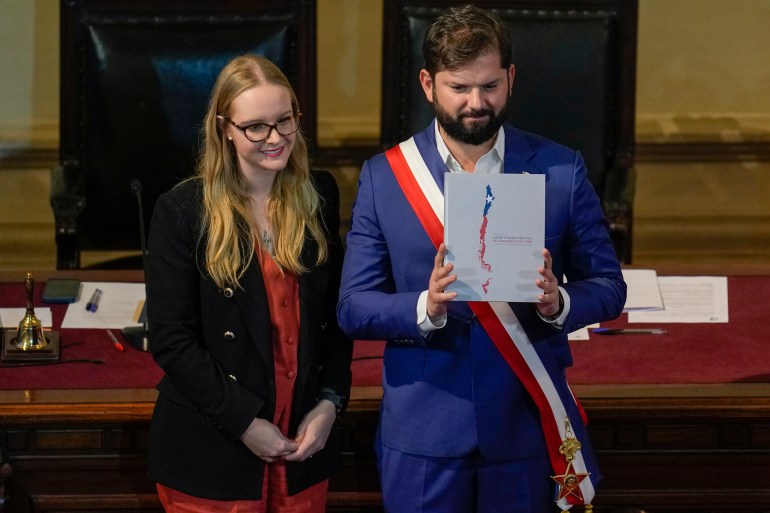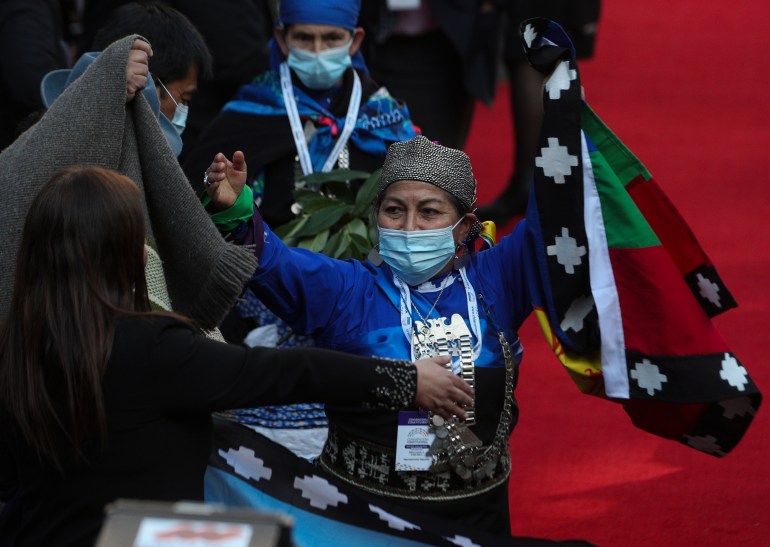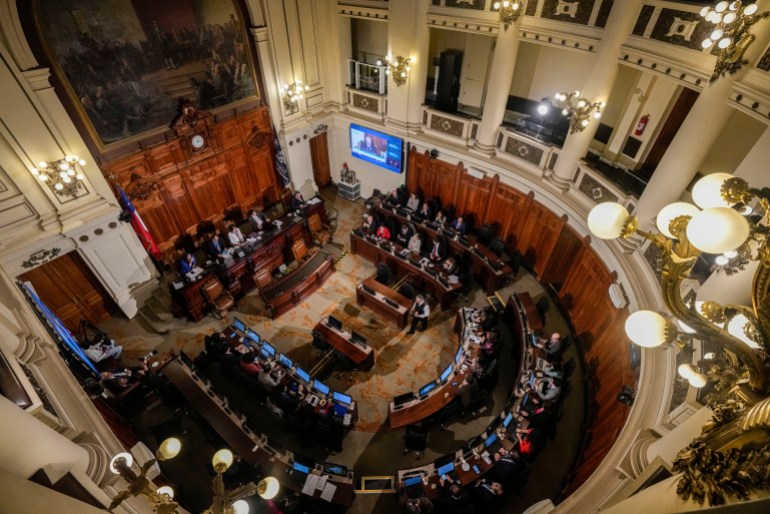But now, as Chile prepares to vote on a new draft, Ñanco Antilef finds himself in a paradoxical position: hoping to keep the old version in place.
“It’s not that we are defending Pinochet’s constitution. It’s just that this proposal is worse,” he told Al Jazeera in a recent interview.
A member of the Democratic Revolution party, Ñanco Antilef was one of the few left-wing representatives to participate in the Constitutional Council that drafted the new version, which is set to go before voters on Sunday.
Rather, it was Chile’s far-right Republican Party that led the drafting process, holding 22 of the council’s 50 seats.
The result, critics say, is a draft that favours right-wing priorities at the expense of historically marginalised groups, including Chile’s Indigenous peoples.
“It is tied to a business model and favours individual interests rather than collective ones,” said Ñanco Antilef, himself of Indigenous Mapuche descent.
Now, he and other Indigenous Chileans are pushing for voters to reject the draft constitution, even if that means the country will be stuck with the Pinochet-era version for the foreseeable future.
“We are 13 percent of the population,” said Alihuen Antileo Navarette, a Mapuche lawyer elected to represent Chile’s Indigenous peoples on the council.
He argues the draft constitution deliberately “excludes” Indigenous voices from government.
“The text does not ensure that we have institutional representation, neither in Congress nor in the Senate, and it ignores our historical demands to respect our ancestral territories,” Antileo said.

A history of inequality
Sunday’s referendum will be the second time in as many years that Chileans have gone to the ballot box to weigh a new version of the country’s constitution.
President Gabriel Boric indicated it would also be the last opportunity to swap out the Pinochet-era constitution for the remainder of his four-year term.
“Whatever the result that the people choose, that process will come to an end,” Boric said at a summit of world leaders last month.
The history of the current constitution stretches back to 1980, when Pinochet — a ruler who oversaw the mass abduction and execution of his left-wing critics — appointed a government commission to draft a legal framework to formalise his authority.
Ñanco Antilef grew up during the dictatorship in the 1980s. “There was a strong repression. We didn’t even go out on the patio of our house because police would throw tear gas. It was a situation of fear. I remember they shot a neighbour dead. These are the memories I have of that time.”
Living in a low-income neighbourhood on the periphery of the capital Santiago, Ñanco Antilef also witnessed inequality that he now credits to Pinochet’s right-wing model of governance.
“It allowed people who had resources to maintain their privileges, and for the people who didn’t, it was difficult to obtain a higher quality of life. I was only able to go to higher education because I won grants and got help from others,” he said, adding: “Pinochet’s constitution generated a very individualistic society.”
The 1980 constitution has been criticised not only for its undemocratic origins but also for enshrining Pinochet’s rigidly conservative values in Chilean law.
Opponents say that, despite numerous amendments, the constitution still curtails social welfare programmes in favour of protecting free-market values. It also fails to acknowledge Chile’s Indigenous groups, which comprise an estimated 2.2 million people.

A tale of two drafts
Concerns over social welfare ultimately simmered into widespread anti-government protests in 2019. Millions of Chileans flooded the streets, voicing a spectrum of demands, including calls for better public healthcare, fairer access to education, abortion rights and pension reform.
Many protesters singled out Pinochet’s constitution as the root cause of the discontent. That prompted Chile’s government to hold a referendum in 2020 to decide whether to ditch the old charter and write a new one.
The voters came back with an overwhelming response: 78 percent approved of the proposal, and a plan to reimagine the constitution was hatched.
But the first attempt floundered. Written by a Constitutional Council comprised mostly of left-wing leaders and independents with no political experience, the 2022 draft was seen as lengthy, confusing and overly progressive. It failed at the ballot box, with 62 percent of voters rejecting it.
In May, another election was held to determine who would write the second draft. This time, voters turned to the conservative right.
“After [the] progressive movement, there was a regression and fear of change,” Claudia Heiss, the head of political science at the University of Chile, said of the swing rightward.
She believes the draft on Sunday’s ballot enshrines values and ideas that “don’t belong in a constitution”, by recognising “patriotic symbols” and protecting “the patriarchal conception of society and traditional gender roles”.
Among the most controversial additions is an article that appears to acknowledge the rights of “life of those who have yet to be born” — language that could tighten Chile’s already restrictive abortion laws.

Draft prompts Indigenous concerns
But Indigenous rights supporters also see Sunday’s draft as a step backwards, after the promise of the first rewrite attempt.
The first draft envisioned Chile as a “plurinational” country, “composed of various nations” that recognised Indigenous rights to autonomy and self-governance.
The second version, however, defines Indigenous groups as “part of the Chilean nation, which is one and undivided”.
The number of Indigenous representatives on the second Constitutional Council was also curtailed. Indigenous candidates had to receive at least 1.5 percent of the total vote to have a seat on the council. Only one, Antileo, qualified.
By contrast, the first council included 17 seats for Indigenous groups, distributed according to population size. The Mapuche, Chile’s largest Indigenous population, were given seven seats, while the Aymara were given two. Eight other Indigenous groups — the Atacameño, Colla, Quechua, Yagán, Kawésqar, Chango, Diaguita and Rapa Nui — were given one seat each.
Experts like Salvador Millaeo, a Mapuche lawyer and academic at the University of Chile, indicated that the new constitutional draft’s shortcomings are part of a long tradition of Indigenous marginalisation.
“Chile has a terrible relationship with its Indigenous people,” Millaeo said. “We need rules that establish an equal distribution of development opportunities where ancestral grounds are recognised, and the cultural patrimony of Indigenous people is protected, respected and guaranteed.”
He explained that Sunday’s constitutional draft only mentions Indigenous rights in an “abstract” way, by saying the law “could” include Indigenous representation in Congress.
The new draft would also strengthen Pinochet’s governance model, upholding neoliberal principles that are at odds with Indigenous values, Millaeo said.
“For example, the idea that nature is not an object but a subject that needs to be cared for — that’s not in the current [constitution], but the new proposal goes even further away from that.”

Voter fatigue high
That Indigenous viewpoint, however, runs contrary to many of Chile’s business interests.
The country is one of the world’s top copper producers, and its economy is hinged on resource extraction. Mining makes up about 58 percent of the country’s total exports.
Fernando Hernandéz, a civil engineer who works in the mining sector, said he plans to vote in favour of the new draft constitution because it protects Chile’s economic interests.
Land should “generate value, jobs and growth”, Hernandéz explained.
But like many Chileans, Hernandéz is sceptical of what a new constitution can achieve. And after nearly three years of constitutional votes and councils, fatigue is setting in.
“Chile won’t transform from one day to another by changing the constitution,” Hernandéz said. “This has been exhausting for Chile and for its people.”
Ñanco Antilef, the architect who participated in the Constitutional Council, agreed that voter enthusiasm is waning. “There’s electoral fatigue and less interest in the process this time around.”
But he insisted that voting was still important, if only to protect the status quo — and hold out hope for a better deal in the future for Indigenous Chileans.
